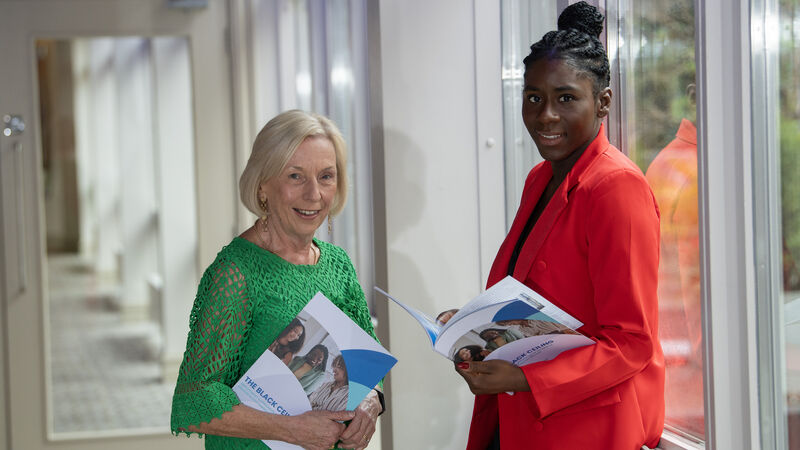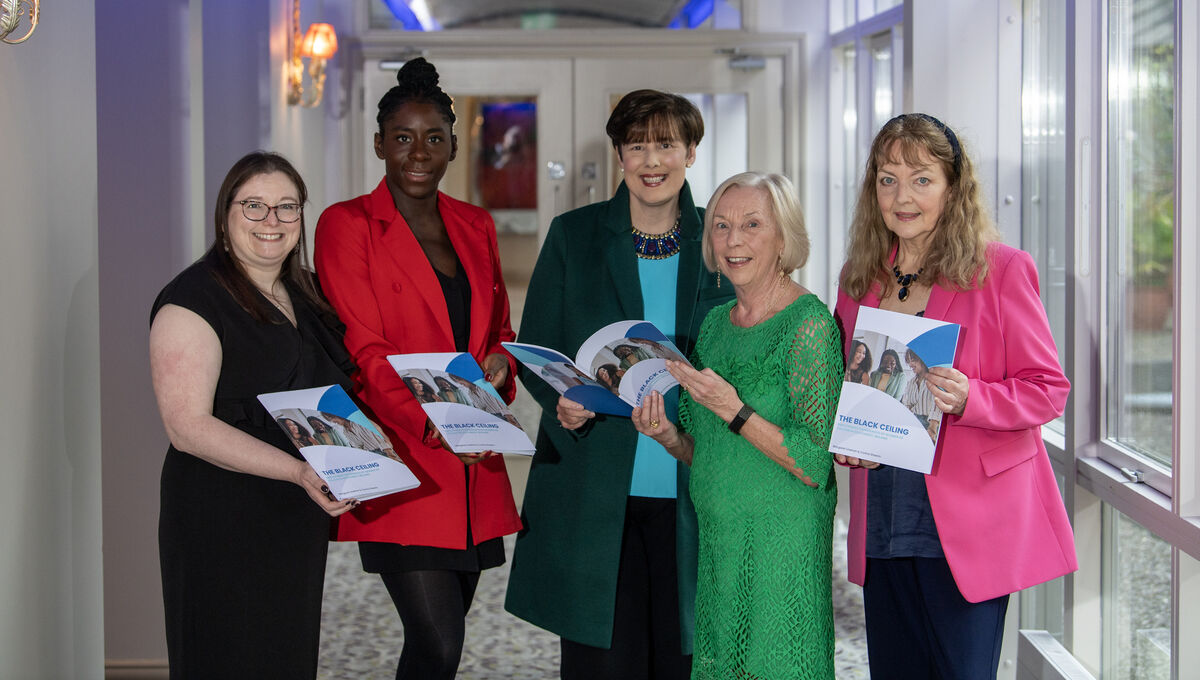Cork professor: 'It was terrible to hear about the discrimination they suffer'

Professor Margaret Linehan, Head of the School of Humanities, MTU and Dr Wendy Oke from Cork at the launch of The Black Ceiling report. Picture: Domnick Walsh © Eye Focus
PROFESSOR Margaret Linehan says she often felt like apologising to the 18 women she interviewed for her recently published report, co-authored by Dr Corina Sheerin of the National College of Ireland, and funded by the Irish Human Rights Equality Commission.
Entitled The Black Ceiling: Employment Experience of Women of Colour in Southwest Ireland, the report certainly makes for harrowing reading, documenting the experiences of women of colour working in rural communities in this part of the country.
Professor Margaret Linehan is Head of the School of Humanities at Munster Technological University and author of over 16 academic textbooks. This is both her first time researching the experience of women of colour in Ireland, and the first time the topic has been researched.
As referenced in the report, most of the literature on women in the workplace focuses on white women in professional contexts and fails to address broader power structures and the experience of working women from minority groups.
“I’ve done a lot of work around women in leadership positions, but I identified a gap in the literature when it came to the experiences of women of colour in Ireland – granted there may be difference between rural Ireland and our cities,” said Professor Linehan.
The academic was struck by the warmth and openness of the women to tell their stories.
They were all so lovely and genuine to talk to, each of them just wanting to get on like anyone else. It was wonderful to hear from them, but also terrible to hear about the discrimination they suffer.
Some of their stories certainly suggest that rural Ireland has a long way to go before it can be characterised as inclusive.
The Cork-based professor recalls a few examples.
“One woman told us how her employer referred to her as a monkey in front of customers. That is just so awful.

“Another woman who works in a factory was accused of stealing something that went missing and was arrested in full view of everyone. When they investigated, she was found innocent. She had no choice but to return to work there, despite her experience.”
An obvious similarity among the women is how over-qualified they are for the jobs they are in, she says. They also face difficulties with visas, transport, and accommodation.
Seventeen of the 18 interviewees are highly qualified in a wide range of disciplines, having achieved primary and postgraduate qualifications, yet face significant challenges to securing any employment.
A strong recurring theme from all interviewees was the difficulty of finding a job and getting ‘their foot in the door’ of an organisation. They were disappointed when their skills and experiences from elsewhere simply weren’t recognised here.
“The vast majority of the participants have third-level education but, as they put it, end up in jobs ‘the Irish don’t want’. Many of them are cleaning or in hospitality.
Despite their abilities, they are afraid to go for promotions because of how their fellow employees might react. They report feeling a very low level of trust at work. It isn’t just about managers; it’s about being made to feel unworthy by their fellow employees.
The precariousness of their work also made it difficult for Professor Linehan and her co-author Dr Corina Sheerin to find people willing to participate.
“That was really striking for me. Many women of colour work without contracts so they are afraid to come forward for fear that we might report them to social services. They are afraid to give us personal details like phone numbers or addresses for the same reason.”
The report also highlights a lack of trust in these women. One interviewee says: “If I make any little mistake, it will be reported to the management. It does not go unnoticed by me. It is difficult working with people that are not ready to accept me. They are not accommodating and not ready to give me space and support.”
The thrust of the report, however, is not only to describe the negativity of the situation for women of colour in Ireland, it also offers very practical and manageable solutions. This was very much the intention of the report, says Professor Linehan.
Following the interviews with the 18 women, recommendations are offered for fellow employees, employers, and policy- makers.
Professor Linehan is clear that even small things can make a difference to a woman at work, perhaps the only black woman, the ‘token’ black woman, as she can sometimes feel.
“Small things like celebrating a birthday or celebrating someone’s culture or food can really help. Companies should have food days. Inviting someone’s children in can help too, or just making sure to ask them along to any social event. These can all contribute to making someone feel included,” said Professor Linehan.
Management must also play a role, according to the report, the academic says.
“All staff should receive unconscious bias training and diversity training. Interview boards should include people of colour. Some of these steps are very straightforward and easy to implement.”
Dr Linehan also believes that women’s networks, women of colour networks like the Phoenix Women’s Centre, and SHED in Tralee, who first commissioned this report, are key to bringing about positive change.
“Bringing women together so that they can get peer support and advice is important. These networks can also organise social events which really help.”
Mentors are also key to addressing these problems of discrimination.
“This is why we were so happy and honoured to have Dr Wendy Oke speak at the launch of our report. She has lived in Ireland since she was six or seven years old. It is so important for women of colour to have mentors in their lives. She was just brilliant and brought a lot of positivity to the event.”
Dr Oke’s foreword includes memories of childhood, when aged seven she was told to go home and ‘wash her face’. She later recounts graduating with a PhD and setting up her own technology company. She refers to the report as one part of what must be an ‘enduring commitment’ to tackling workplace discrimination.
Dr Linehan echoes this practical and unwavering approach to secure safer, happier, and more equal working conditions for women of colour.
“We really want this report to be solutions-focused. Listening to these women’s lived experience was a great privilege.
They were afraid to come forward but once they did, they were incredibly open and honest. We really hope we can help these women in real ways.
Dr Linehan certainly doesn’t want this report to sit on a shelf gathering dust. It is not that kind of report, she says.
In his foreword to the report, Tánaiste Micheál Martin writes: “As a society, we need to be determined to be inclusive and we must be ambitious in tackling racism.”
The Black Ceiling report certainly seems like a practical and fitting first step.
“We hope the government will give these women the chance to do the work they can do,” adds Professor Linehan.
“It has gone to the government now and was launched by Norma Foley. It has also been sent out to employers in Tralee and rural Kerry. We believe this research is important. It doesn’t belong in an ivory tower. We hope it helps to make real change.”







 App?
App?


